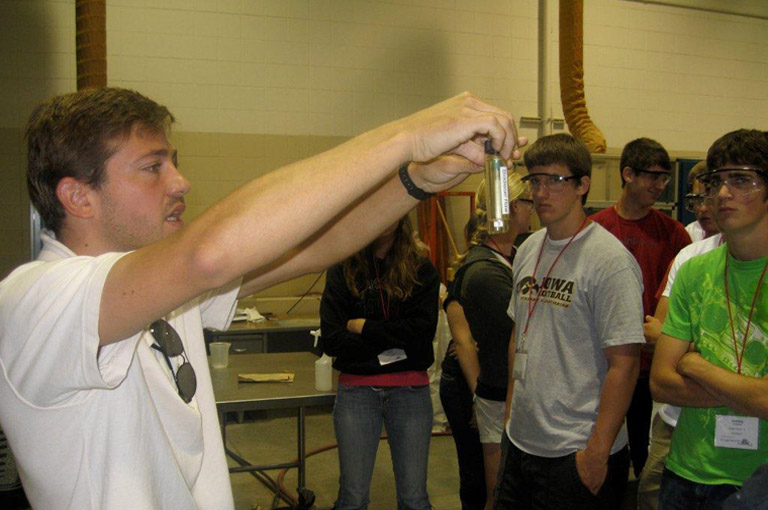A next-gen biodiesel scientist's editorial
August 17, 2011
BY Ron Kotrba
Bernardo del Campo is a Ph.D. candidate at the Bioeconomy Institute at ISU who helps lead an organization called the Next Generation Scientists for Biodiesel, launched last year. The program’s goal is to create an open forum for college students to collaborate, network and share ideas in support of biodiesel. Led by the National Biodiesel Board with support from the United Soybean Board, the program was formed by 28 founding members representing 22 universities stretching across all academia. The members signed an online declaration of support for biodiesel to get the organization off the ground. The declaration reads:
“We, the undersigned student scientists, believe that biodiesel can reduce dependence on petroleum, help address climate change and boost domestic economies. Biodiesel from a variety of feedstocks can meet contemporary needs for environmental stewardship, economic prosperity, and quality of life without compromising the ability of future generations to meet these needs for themselves. We support increased investment in research and develop and higher education to train future scientists by public and private sources that will enhance biodiesel as a sustainable fuel for transportation and other uses. We are confident that scientific advancements can demonstrate, preserve, and enhance biodiesel’s ability to help meet the food, feed, fiber and energy needs of the future.”
Del Campo is helping answer the call for ISU to become an alternative fuels leader, and he wrote the following editorial piece:

(photo: Bernardo del Campo demonstrates the biodiesel process to students)
Just like the national debt, our generation will inherit an enormous carbon debt, as well as a brittle energy platform. Nevertheless, this generation of scientists can make a major impact on the environment, energy security and social development around the world. That’s why I have chosen a career in biofuels science.
Advertisement
As a developing scientist, I urge us to not fall under the misdirected notion that we must leave today’s biofuels behind in order to pursue a healthier energy future. While I believe there are additional new alternatives very close to making an impact, we should recognize that today’s biofuels are reducing petroleum consumption by billions of gallons in the U.S. each year, while providing environmental and economic benefits to society.
With biodiesel, a diesel-like fuel made from agricultural byproducts and co-products, we have the nation’s only commercially available advanced biofuel. In this respect, advanced biofuel is defined by the Environmental Protection Agency as being renewable and reducing at least 50 percent of the greenhouse gasses compared to its petroleum counterpart. Undoubtedly, the next generation of fuel has already launched. Biofuels science is also one of the most actively developing areas, and tomorrow’s improvements will make this industry even better.
It is also important to note that biofuels like biodiesel accomplish many benefits while in many ways enhancing food security.
Food and fuel, produced side by side, help each other thrive. If you think about it from this perspective, it’s easy to see how biofuels can actually help strengthen food chain stability worldwide. Alternative uses for food co-products will stabilize the demand and food growers will benefit from lessening volatility in commodity prices. When farming is more stable, the food supply is more stable.
In 2010, the U.S. biodiesel industry produced 160 million gallons of biodiesel from soybean oil, which co-produced enough soybean meal for 48 billion rations of protein like those used in global hunger programs. And less than half of the biodiesel today comes directly from soybean oil. In 2010, just six percent of the soybean oil produced by U.S. oilseed crushers was used for biodiesel, leaving protein in tact to nourish humans and livestock.
But soybean oil is just one source. Biodiesel is the most diverse fuel on the planet, also made from things like fat, recycled cooking oil, and someday, algae. Fuels like biodiesel are encouraging crop diversity and more efficient use of our resources.
Biodiesel is also stimulating new technology and encouraging strides in agricultural efficiency. The incoming investments in research and education will lead the next generation into green jobs, and will sustain communities around the countryside. I have seen evidence of this in America, and also in my native Uruguay.
Advertisement
The biodiesel industry is undergoing a major renaissance in Iowa and beyond, and future scientists have the responsibility to ensure it remains an important part of our energy supply. I have confidence that tomorrow’s bioenergy pallet will be based on many alternatives working together to help us break free from our addiction to petroleum. We can and should return to nature to cultivate our energy needs. I am confident that we will stop releasing carbon dioxide from fossil fuels and other air pollutants, we will start storing tons of carbon in a safe and reliable way and we will develop ecologically sound communities.
In order for biofuels to continue their success in bringing a new energy economy, we must stay committed to them, politicians must take the lead to support them, and entrepreneurs must keep taking risks to challenge centuries of fossil fuels, and fossil thinking. The general public will have to choose to adopt greener ways of living and hold tight to energy conservation and efficient use of resources. We may all need to spend a few more cents on better fuels and greener products, but this will actually save society money in the long run. Parents, educators and extension agents around the world must stay committed to a greater legacy.
Only then can we say we will leave the world a better place for future generations.
Bernardo del Campo is a PhD candidate at Iowa State University, studying Biorenewable Resources and Technologies and Mechanical Engineering. He helps lead the ISU BioBus Project, turning the campus’s waste grease into biodiesel for campus buses. He is a co-chair of the Next Generation Scientists for Biodiesel, a professional development society hosted by the National Biodiesel Board.
Upcoming Events





